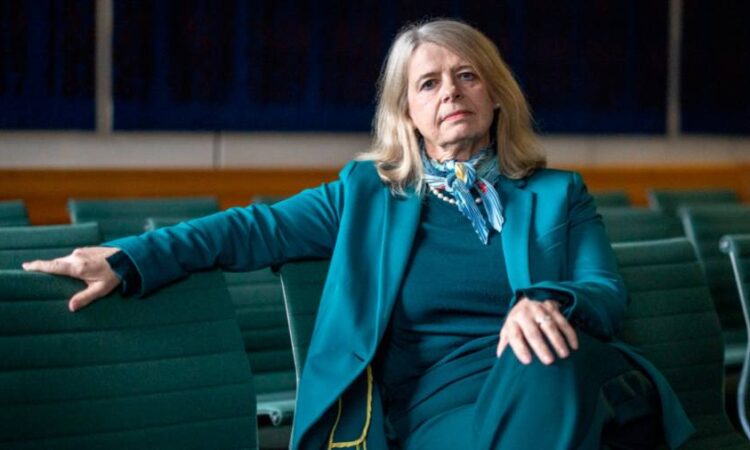
The UK government is exaggerating the benefits of its landmark financial reforms and being “disingenuous” in describing it as a Brexit dividend, according to the Conservative chair of a key parliamentary watchdog.
The landmark reform package was announced in Edinburgh last month by Chancellor Jeremy Hunt, who said that many of the changes were only possible because of “freedoms” gained from leaving the EU.
“I thought that it was a bit disingenuous to package it all as stuff we could do as a result of Brexit freedoms,” Harriett Baldwin, a senior Tory, said of her party’s 30-point action plan of new financial sector rules, adding that the overall package was “not as major” as expected.
Baldwin, a 21-year veteran of US banking giant JPMorgan before she pivoted to politics in 2010, was elected chair of the Treasury select committee on November 9. Now MP for West Worcestershire, the 62-year-old’s public service CV includes stints as City minister during the government of David Cameron, minister for defence procurement and minister of state for Africa.
Two of the most-high profile elements of the Edinburgh reforms were changes to the ringfencing rules that insulate retail banks from trading losses and a review of the senior managers regime that holds executives responsible for failings on their watch. Both were introduced by the UK government in the aftermath of the financial crisis, with no input from Brussels.
The decision to include such a broad group of changes in the package “was slight spin I thought”, said Baldwin. She added that in any case the government was not proposing “very many changes” to the ringfencing regime, except for “some of the smaller firms”, who would have an easier time under the proposed new rules.
The government originally dubbed the long-awaited reform package Big Bang 2, before settling on the more modest name. “I thought, looking under the bonnet, it didn’t look as major as perhaps it had been billed,” said Baldwin, echoing the views of industry leaders.
She added that the TSC had been pushing, and would continue to push, for a “timetable” from the Treasury on the implementation of the reforms.
Regulators, who stepped in to rescue the UK government debt markets from politically inspired peril, were at least partly responsible for taming some of the Treasury’s more libertarian impulses and continue to warn against deregulation.
As chair of the TSC, Baldwin is responsible for interrogating the performance of Treasury and financial regulators as they pursue their sprawling briefs against a backdrop of runaway inflation and an expected recession.
The committee’s key focus areas for 2023 include overseeing the rollout of the Edinburgh reforms, holding the Bank of England to account on inflation and the resultant cost of living crisis, and advancing the financial services and markets bill, which will underpin the UK’s post-Brexit financial regulation.
The committee is also trying to encourage better regulation of novel corners of the financial services sector.
Baldwin, who took over the TSC’s chair from work and pensions secretary Mel Stride in November, also vowed to “rigorously scrutinise” the BoE’s efforts to bring inflation “back under control”, describing rising prices as “the worst possible tax that you can put on poor people”.
She is critical of the BoE for not acting sooner to prevent the 20 per cent of inflation estimated to be caused by domestic pressures such as persistently low interest rates, rather than international factors like the higher oil prices resulting from Russia’s invasion of Ukraine.
She is also heavily critical of the IMF, whose officials are so far refusing to appear before the TSC to explain their scathing criticism of former prime minister Liz Truss’s controversial, but shortlived, tax cuts, an unprecedented intervention that contributed to a spike in UK borrowing costs.
The tax cuts were abandoned when Kwasi Kwarteng, the then chancellor, was abruptly ejected from office by Truss, whose own demise followed swiftly, ending the UK’s shortest premiership.
“If they hadn’t put out a lot of stuff on the record during the crisis in September and October, I’d be less insistent [on them attending],” Baldwin said. “But I do think that big public institutions like that, particularly when they are wont to offering their unsolicited advice, ought to when solicited come and give that advice on the record.”
In a wide-ranging interview, Baldwin also called for the Financial Conduct Authority, which regulates the sector, to move faster on regulating “buy now pay later” lenders who offer credit on everything from £10 takeaways to shoes to consumers but operate almost entirely without oversight.
“They reassure us they are going to get to it . . . they don’t think they’re going to do it early next year, that seems to have slipped to later in the year,” she said, adding that faster progress “would align more with what parliament would like to see”.
The FCA said it would consult on buy now pay later regulation as soon as the government brings forward legislation.
Baldwin praised the FCA for its efforts so far on cryptocurrency, where it has limited powers but has managed to “keep quite a lot of these bad actors quite a distance away” from UK individuals.

In her first week as chair, she launched a TSC inquiry into crypto, likening the hype around the industry to the Dutch tulip mania of the 17th century. The committee will publish its report next month, as the government finalises its plans to impose order on the “Wild West” of finance.
Asked about the government’s aspirations for a crypto hub in the UK, Baldwin said the underlying technology was useful and that eliminating crypto entirely was not feasible.
“The freedom for people to do silly things with their money is likely not to be something that, with the best will in the world, we can ever stop people from doing,” she said.





